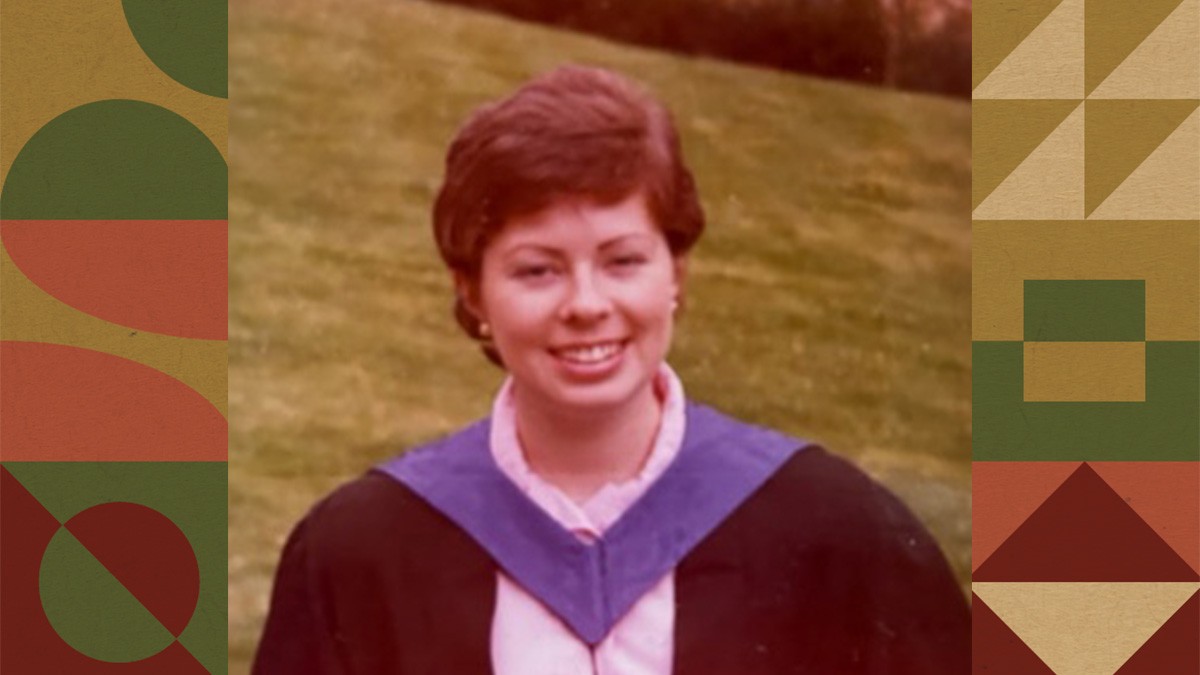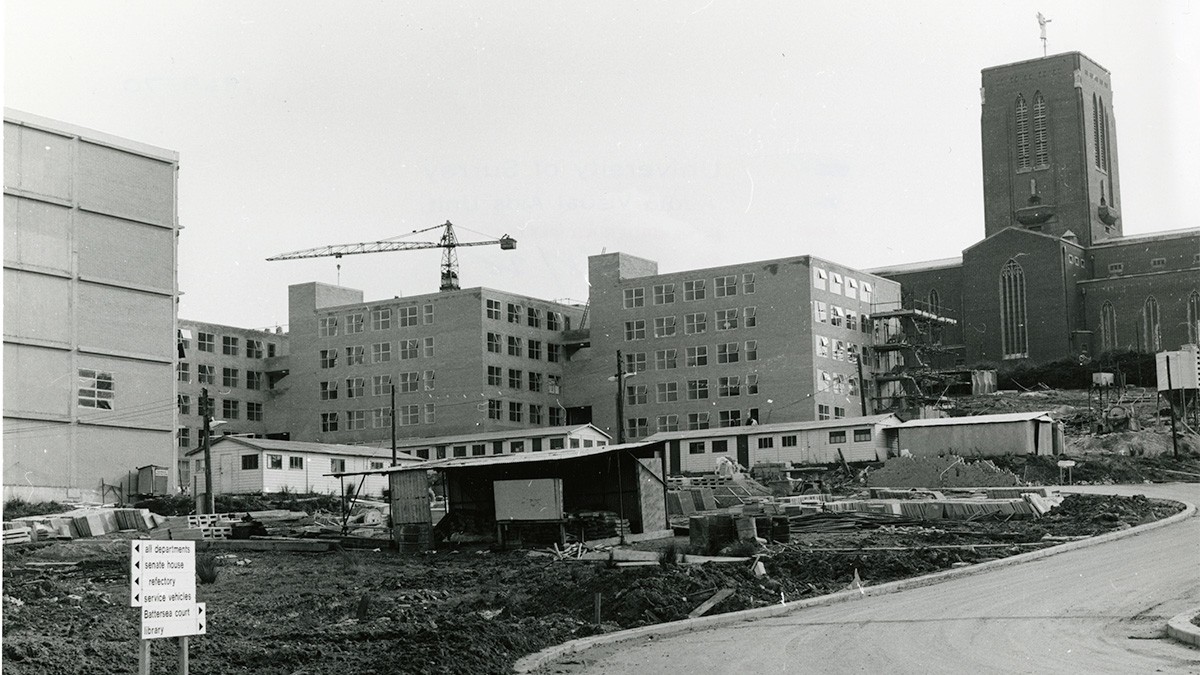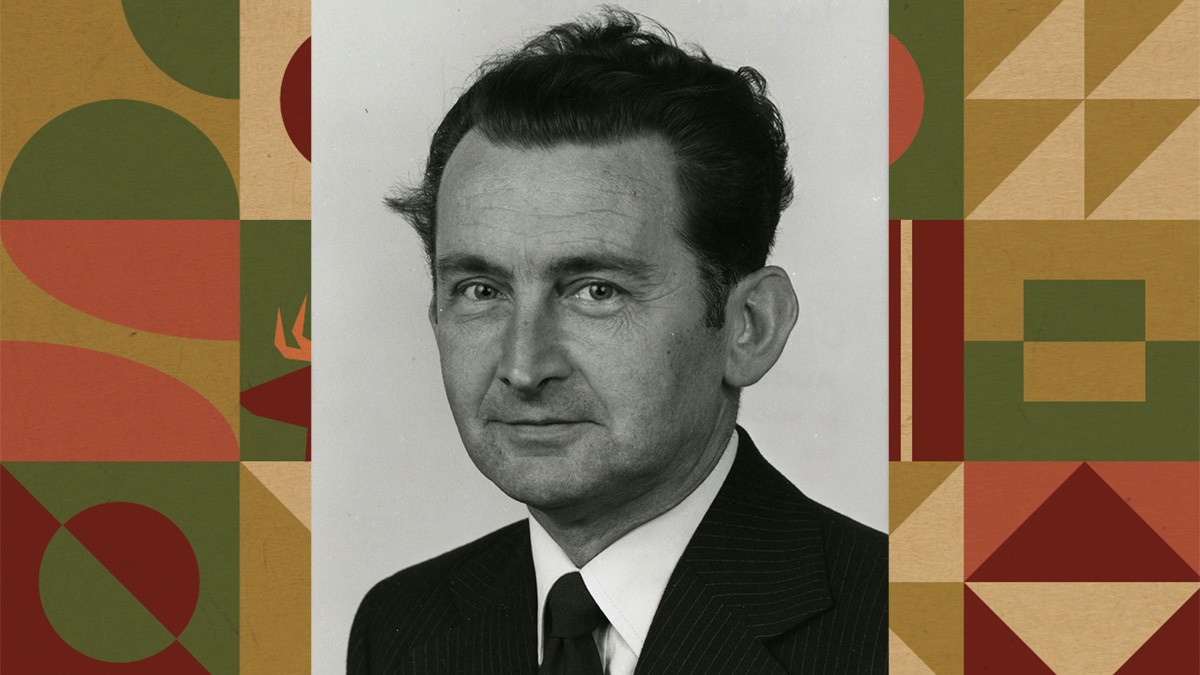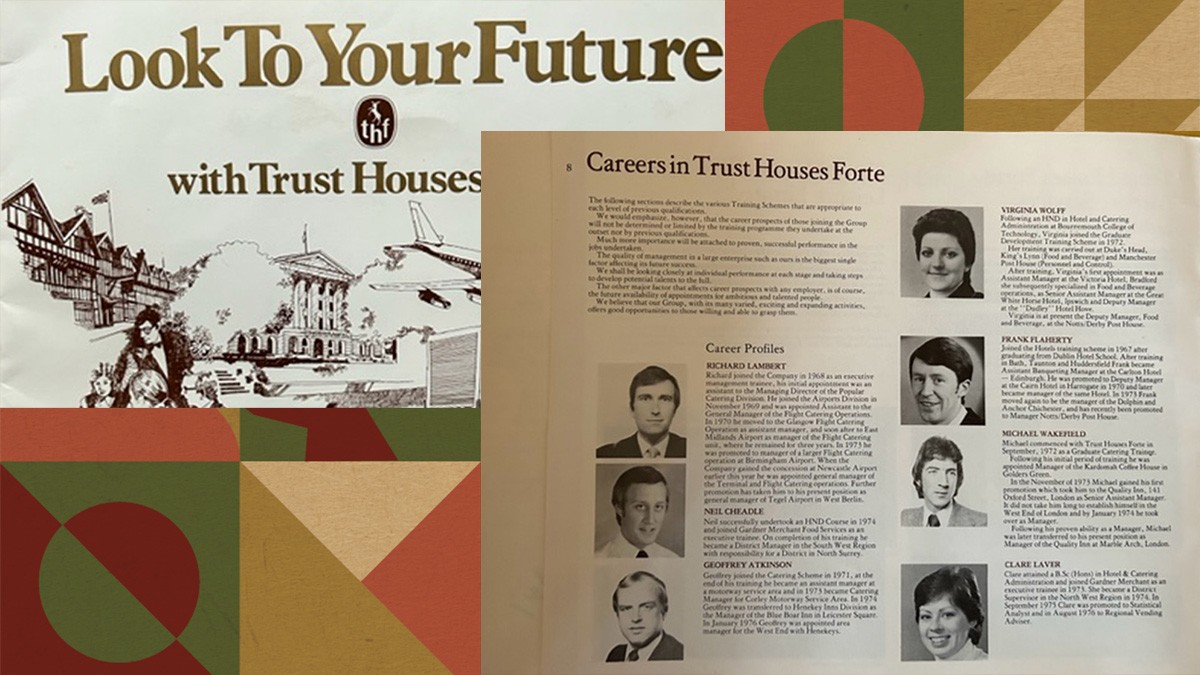“I had the time of my life!”
Clare Hoy left her Romford home to study a BSc (Hons) in Hotel and Catering Administration at Surrey from 1969-1973. During her course, she was offered a job by a UK business mogul and she met Her Late Majesty, Queen Elizabeth II!

Clare on her graduation day in 1973
Why did you come to Surrey?
I wanted to study business, but I didn’t do well in my O Level Maths. This was at an all-girls school in the 1960s, so the career options weren’t plentiful. If you left that school at 16, it was generally to do secretarial work. If you left at 18, it was teacher training, nursing or university.
I secured a conditional offer to study business at a polytechnic. I looked around for a more practical course, too, and I found hotel and catering. It seemed to be a course for extroverts because it was customer-facing. I liked the organisational side of it.
The two places offering degrees in this subject were Strathclyde and Surrey. Strathclyde was not only a long way from Essex, but it was only offering an ordinary degree. Surrey, however, offered an honours degree.
What was it like to study at a new university?
Having studied at an all-girls school, coming to the University was novel. The male to female ratio on campus was about 80 per cent male to 20 per cent female. A couple of the girls on my corridor were studying physics and there were only four or five of them in their entire year. It was a bit of a culture shock, but it wasn’t an entirely unpleasant one.
Was campus still under construction?

The muddy Guildford campus was still under construction when Clare arrived
It was muddy. They were building the “Diddy Houses” on the hill when I arrived in 1969, so there was a lot of construction going on. I ended up living in digs off campus in Stoughton in a three-bedroom council house. My host family were an Irish postman, his Italian wife, their two daughters and the postman’s brother. I had the little box room.
Next door was a widow who also took in a student on my course and he had a car. The neighbours arranged for him to drive me into University and back home for the first few weeks while I found my feet. They were lovely and very kind people.
Did you live in student accommodation?
In the second term, I heard one of the girls who lived in Battersea Court was moving out. I asked the warden if I could have her room, so I ended up living there for the last two terms of my first year.
Student digs and Battersea Court represented my first time living away from home and it was fine. I also made friends with a lad from another course who had a car and lived near Romford. I’d sometimes get a lift back home with him if he was heading to Essex.
What were the best bits of the course?
The three core subjects to begin with were economics, law and accounting. I enjoyed those, even though I didn’t always understand everything. I was hopeless at the food preparation. I haven’t improved in that area either.
I loved the final year where we studied human resource management. I remember writing an essay that I got very high marks for because I’d read a whole book on the topic! I also recall studying catering administration, environmental studies, tourism and nutrition. I always found the nutrition quite straightforward.
Did you enjoy your time at Surrey?
I learnt a lesson for life during my industrial year. I remember coming back to campus while I was working in London and catching up with friends who weren’t taking professional training years, and life was simply going on without me. I wasn’t part of the scene. People weren’t being hurtful or cruel, but life was just going on without me. Don’t go back!
Tell us about your year in industry…
I worked for J Lyons Catering in London and it was fantastic. I had the time of my life. I worked all over the UK during that year, and I lived in London. Myself and two course colleagues, who were doing their industrial year in the catering department at Harrods, shared an attic flat in Redcliffe Gardens in West London for six guineas a week each.
All Surrey students were paid £15 per week, but we ended up paying tax on that because we had to work from April to April to get bedded in and up to speed for their busiest period. Fortunately, we were fed at work so we did get to go out, but we certainly didn’t have enough spare money to live it up in any way. We were poor students!
I got to meet Her Late Majesty, Queen Elizabeth II in 1971. Lyons did the catering at her garden parties and I ended up working in the tent with the diplomats. Every year, she was presented to various people and Sir Norman Joseph, Chairman of the company, introduced Her Majesty to a line of people and I was one of them. She said “Hello” and I just went off talking about my course and my industrial year. Sir Norman was clearly impressed. He said to my supervisor, “Tell that young lady she can have a job with us wherever she wants and doing whatever she wants when she graduates!”
Did you take part in any clubs?
I was involved in the Hotel and Catering Department Society and its social activities. I didn’t join any other clubs, which was surprising. I’d done a lot of acting before coming to Surrey and I’ve done a lot since, but I never got involved in any of the drama societies.
I did play hockey for the University Hockey Team because one of my best friends was the captain of the club. She’d signed up several county players at the Freshers’ Fair, then she lost the list. She was always short of women and I was roped in to play most Wednesday afternoons. I didn’t have any equipment, but I managed to get some when I returned to my old school. The PE teacher there laughed her head off when I told her I was playing hockey for the University of Surrey. I certainly hadn’t shown much prowess in my school days.
Did you attend any student gigs?
I remember going to a concert where the choir sang. It was the first time I heard The Sea Symphony by Ralph Vaughan-Williams and that was fantastic. But I don’t recall attending a lot of gigs. I don’t think I had the money to go to them. My spending money for food and everything else was £4 a week once my accommodation bills were paid.
What was Guildford like?
There was a bit of separation between town and gown, but that was mainly because everything we needed was on campus. I’d sometimes venture down to the High Street to buy cheap groceries at Sainsbury’s. If my parents visited, I’d take them to The Jolly Farmer for jacket potatoes.
What are your key memories of Surrey?

"He was kind and supportive," says Clare when discussing catering and hospitality degree pioneer Rik Medlik
I remember discos in the bar at the Students’ Union. These were a bit ad-hoc and not very sophisticated, but they were fun. It was like a youth club with cheap beer.
I also remember sitting finals in the Sports Hall and the Main Hall. One of the big chart hits at that time was Stuck in the Middle with You by Stealers Wheel, and one of the lyrics was “Clowns to the left of me, jokers to the right, here I am, Stuck in the middle with you.” I remember thinking I just had to get through this exam as that went through my head.
I had a family tragedy before that and I recall how kind and supportive Professor Rik Medlik, who ran our course, and the rest of the staff and students were. I really knuckled down and worked for those exams. I’m delighted to report that it paid off.
What was Rik Medlik like?
He was an extremely precise man. I remember him giving us a talk in our first year when he was trying to encourage us to work hard. He explained to us how we should organise our days, “leaving one hour for the process of living”. By this, he meant cooking, cleaning and ironing. The phrase, however, remains with me.
What did you do after graduation?

Clare worked at Trust House Forte and featured in their in-house recruitment brochure
I wanted to work where ordinary people were eating, so I didn’t ever fancy a job in a high-end restaurant. I joined the Executive Training Programme at Gardner-Merchant in 1973. During the scheme I was moved to work for them in Manchester. I worked there for five and a half years.
I then took a bit of a sideways move because I’d been involved in a lot of training of other people at Gardner-Merchant. I became a training advisor for the Food, Drink and Tobacco Industry Training Board in the 1980s. I loved that job, but I was made redundant after three years when the organisation was scrapped. Fortunately, three of the companies I worked for set up a training association that solely employed me to work for them and sell my skills into other companies. I had a spell being self-employed in that role, but I got a bit bored and I took an Open University arts degree.
I was also a magistrate at that time and a bench colleague who worked at Keele University invited me to do a Masters in Criminology. As soon as a I finished, I was working as a tutor for undergraduates at Keele and I wrote a book. After a few years, I retired from everything.
I’ve been very fortunate because my husband and I have travelled a lot and we do a lot of voluntary work, and it’s just fun.
What advice would you give the undergraduate version of yourself?
Join some societies. I had done some singing and acting, but I never explored those options at University. I was too concerned about being distracted from the reason that I was there and getting that degree. There were some people in my friendship group who were never there, but I never missed a single lecture. There was also a system of marks for attendance and that helped you achieve merit marks, so I was always present.
I remember being invited to a May Ball at Trinity College in Cambridge and fretting that if I went, I’d miss a lecture or a test. I decided to go in the end. That decision made not a blind bit of difference. I put myself through all that stress for nothing. So remembering to enjoy yourself is one bit of advice I’d give.